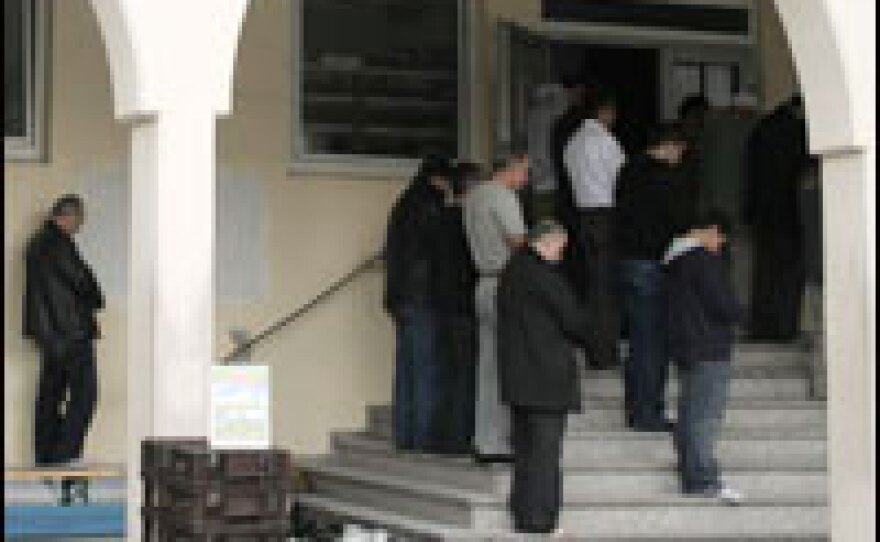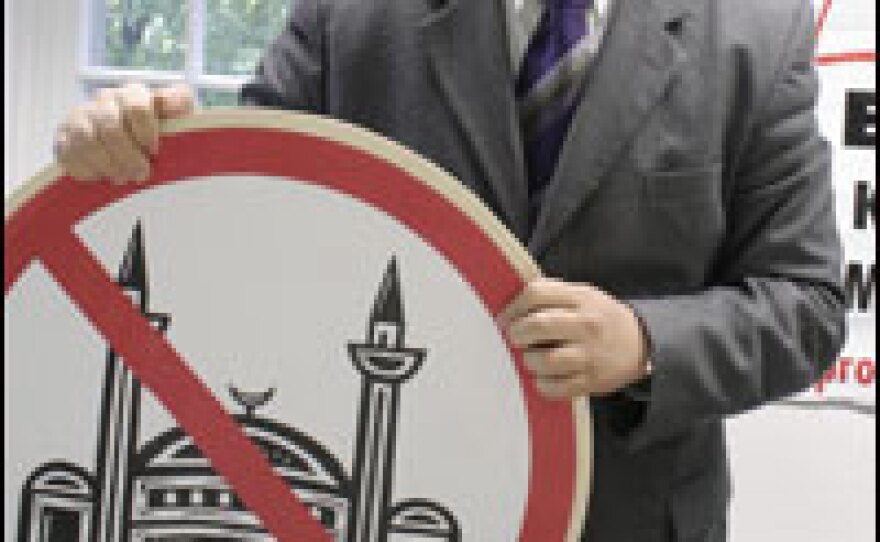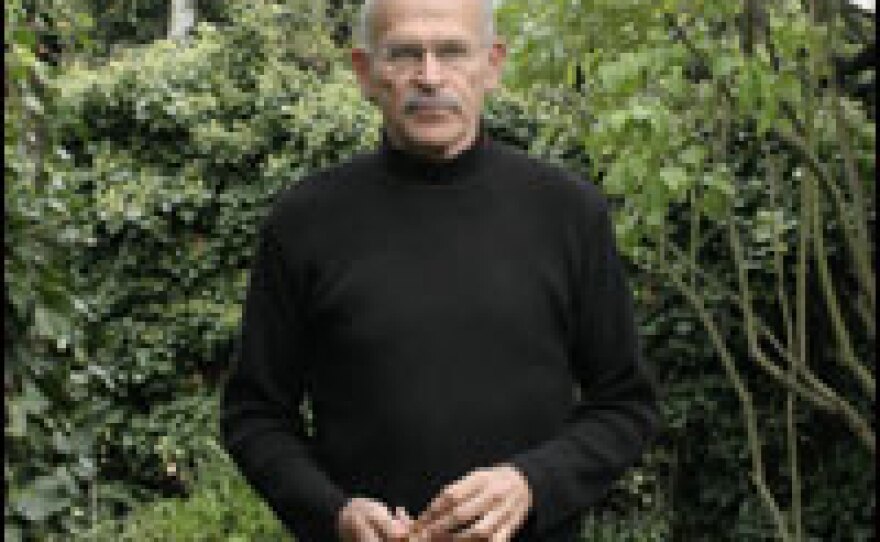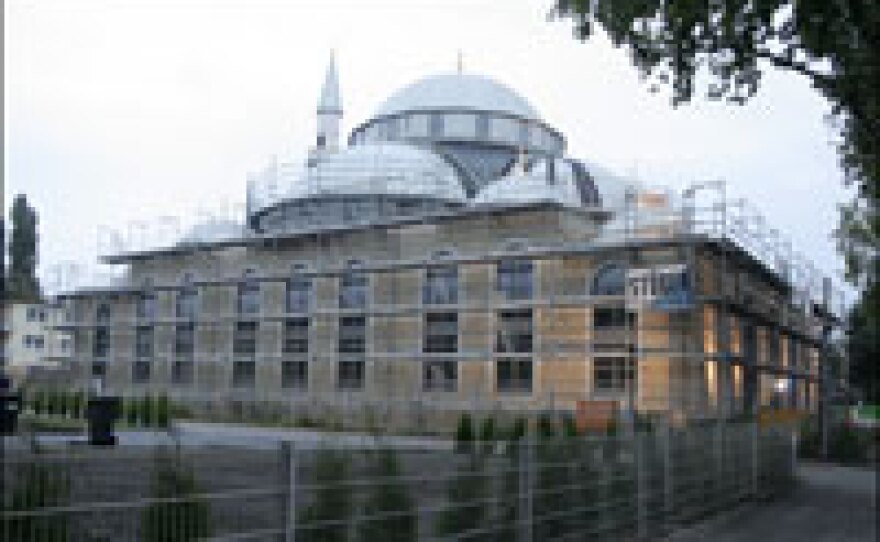



Simmering conflicts about immigration, integration and Islam in Europe have flared into an unrestrained national debate about whether a big, new mosque should be built in Cologne, Germany. But another large, new mosque an hour's drive away faces little opposition.
Zuelfiye Kaykin is head of a Turkish community center that is getting a new home in the mosque under construction in Duisburg, a former coal-mining city near the Dutch border. Kaykin says there was no divisive debate there because German politicians, church and community leaders were invited to advise the project early on.
"These are people the public trusts. Having them participate in developing the concept and the building is one reason why there wasn't any loud, public criticism," she says.
She circulates with friendly grace and a watchful eye through a party breaking the daily fast of the Muslim holy month of Ramadan. Germans and Turks share round tables in a large, white tent across the street from the mosque. Born and raised in Duisburg, Kaykin speaks perfect German. She is proud that banners advertising Mercedes and a national bank hang on either side of a small stage. It's the first time the local branches of such big German companies have sponsored a Ramadan event there.
"In my eyes, it's sending out a clear signal that they recognize the Turkish potential. They see opportunities here," she says.
No Divisive Debate, But Flashes of Discontent
The new mosque in Duisburg will be one of the biggest in Germany. Its walls are up, but the main prayer room is still full of scaffolding.
Sabrina Vorberg, a non-Muslim interning with the mosque organization, points out extra-large windows — a detail intended to promote transparency. The idea was suggested by a local Catholic priest. The community center has a separate entrance from the prayer areas, designed to make non-Muslims feel more comfortable coming in.
The project is "a very good example for making people [live] together," Vorberg says.
But her husband, Thomas Vorberg, volunteers that some of his relatives who live nearby don't like it.
"They are not so happy about this building," he says. "Now they ... must accept that these Turkish ones will be neighbors for many years."
His wife waves at him to stop, but later he explains his relatives get annoyed when they see immigrants banding together to buy and share a Mercedes, for example — a tough economic achievement for a working German family.
An Hour Away, Strong Resistance to Mosque
The sparks of discontent in Duisburg have burst into full flame in nearby Cologne, where another large mosque is planned.
"It's not a sign of the will to integrate but a wrong signal. It is a conquest on foreign territory; it's a declaration of war," says Ralph Giordano, a highly respected Jewish writer in Germany.
But for Giordano, the mosque isn't the real problem. Integration is.
"Apart from individual exceptions, integration is not possible. This is because here we have a clash of two cultures. Islam is simply not compatible with our Judeo-Christian history," he says.
Cologne's new mosque would replace one crammed now into a low, cream-colored building across the street from a gas station.
Open the door during Friday prayer and a wave of moist heat from the packed room tumbles out. Hundreds more pray in a conference room — or outside.
"I believe there is some prejudice ... and lack of information," says Sadi Arslan, president of DITIB, the Turkish Islamic Union for Religious Affairs, the organization planning the new mosque. "Because we have already mosque here. So there is no new mosque."
He says they just want a bigger, modern one.
Arslan is a civil servant of the Turkish government. DITIB was established by Turkey and brings Turkish-trained imams to Germany. This bothers Nikolaus Schneider, president of the Protestant Church in the Rhineland.
"We have the very interesting situation that the Turkish government is doing religious politics in Germany. Which is something very different than the self-organization of the Muslims here," Schneider says.
City's Culture Plays Role in Discontent
Still, Schneider supports the mosque on the principle of religious freedom. He says opposition flared in part because of the history and culture of Cologne. Indeed, the small right-wing political party fanning the flames is called Pro-Cologne.
"For us, Cologne is still a German city, even if that's hard to see in some areas. We want to preserve the German character, the Christian-occidental character of this town," says Markus Wiener, the group's deputy president.
The symbol of Cologne is its Gothic cathedral with its massive organ and towering spires. Those spires are three times the height of the mosque's planned minarets, which would be more than a mile away. Still, the minarets bother Winrich Granitzka of Germany's main conservative party.
"The bigger the mosques become, and the more monumental they appear, the more people fear our culture is being pushed back and another culture is getting more and more powerful," Granitzka said.
His Christian Democrats have the most seats on Cologne's town council but the party is split on the mosque. Granitzka suggests conditions: prayers in German and Turkish simultaneously, children's religious instruction in German and lowering the minarets by 30 feet.
Arslan says the design won't change.
"If you change the minaret, tomorrow another group maybe ask us another. Change the windows, change another. We believe that this decision is our architect's decision and it shouldn't be changed," Arslan said.
Mosque Finds Supporters Despite Debate
Some observers say the controversy in Cologne, compared with the lack of one in Duisburg, is in part simply because of the different personalities involved in the different towns. There are mosque supporters in Cologne, to be sure.
Claudia Meier, an ethnic German and non-Muslim, works in an office nearby and strolls the commercial strip by the mosque frequently.
"I'm actually for it, because the building that's standing there right now is very ugly and a beautiful mosque would make the area more attractive," Meier said.
Nida Yirmaz, a Turkish native who has lived in Cologne for 27 years, runs a restaurant down the street from the mosque.
"What's there now is not a mosque; it's like a rented apartment. But a real mosque is something very different, like a church. Muslims come here from all over for the religious holidays and people want to see a real mosque," Yirmaz said.
But even support comes with challenges. German writer Guenther Wallraff lives a 10-minute walk away from the mosque. He once disguised himself as a Turk, wearing makeup and contact lenses for two years, and wrote about the racism and exploitation he experienced. He supports the new building, but to prove — or test — the community's openness, he proposed reading passages from Salman Rushdie's Satanic Verses on the place the mosque will be built.
Rushdie faced death threats because of the book's depiction of the Prophet Muhammad. But Wallraff says he just wants to foster dialogue.
"I did a reading with neighbors who also go to the mosque. I invited them over, served them tea and cookies and read passages from Rushdie with them," Wallraff said. "And they laughed, they laughed out loud, and in a liberating way."
Mosque officials decided not to host the reading. Despite all the fury, they are expected to get a final permit soon and begin building next year. Hardcore opponents say they may try to block it legally and keep the issue alive for regional elections in 2009.
Copyright 2022 NPR. To see more, visit https://www.npr.org. 9(MDAzMjM2NDYzMDEyMzc1Njk5NjAxNzY3OQ001))







